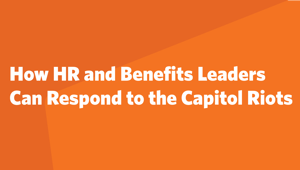
Sorry I’m Late
“I’m sorry I’m late, but there’s a coup going on.” My brother-in-law said that to one of his clients Wednesday afternoon. How many other versions of that were said on Wednesday and the last few days?
I’m sorry I’m late, have you seen what’s happening?
I’m sorry I’m late, there’s something happening in D.C.
I’m sorry I’m late, I couldn’t explain to my kids what they were seeing on TV…
We all went through intense emotions watching events unfold on Wednesday. Michelle Obama captured what so many of us were feeling, especially about the blatant racial double standard that was on display that day. Many of our industry groups and leaders have also issued statements.
All of that piled on top of nearly a year of anxiety, grief, fear, anger, and stress, stress, stress. My friend Aaron Hurst and many others said “Q4 Will Be the Most Stressful in History.” I don’t think any of us expected the first week of January to top that.
Last year opened our eyes to many things, including the ways work and life are integrated. It isn’t realistic to think people’s family and personal lives won’t impact work. And it certainly isn’t realistic to think we can expect people to stay focused and maintain high levels of productivity when surrounded with stressful and traumatic events.
But what are we as HR and benefits leaders to do?
First of all, talk to people. Whatever your political opnion is, it is important to acknowledge what’s happening, and show up. HR Executive’s article “How HR Can Ease Employee Angst Following Capitol Riots” summarized good advice on this topic. Michelle Kim, the CEO of Awaken has an excellent list that she shared with her email list and on LinkedIn. She advises:
- Use precise language to address and describe the event. Avoid drawing false equivalencies between Black Lives Matter protests aimed at fighting for justice vs. an attempted coup led by white supremacists and hate groups whose violent rage is rooted in white supremacy beliefs and racism.
- Unequivocally denounce white supremacy and racism.
- Alleviate emotional and labor burden by proactively and collaboratively reducing workload and cancelling meetings.
- Create a voluntary space for employees to process and gather (please allow folks to opt out).
- Don’t tone-police or gaslight BIPOC employees’ reactions.
- Remind folks about any mental health resources available through company-provided programs or benefits and provide explicit permission to take advantage of them during business hours.
- Revisit your company’s commitment to racial justice and diversity, equity, inclusion, and clarify what core values must be reinforced through concrete policies and accountability practices.
- Draw a connection between white supremacy acts observed in the Capitol and white supremacy culture observed in the workplace (remember all of us are capable of perpetuating white supremacy culture, even with good intentions).
You can share helpful external resources as well. Common Sense Media offers advice on how to talk to your kids about the violence at the U.S. Capitol.
Second, make a plan for how you and your organization are going to show up for your people all year. Last year radically changed the expectations people have of their employers—from the level of individual support and mentorship they want to access to leadership and demands for full transparency. We’ll be talking a lot about that in our upcoming webinars and blog content. Expectations are high for real and meaningful action, especially around diversity, equity, and inclusion.
We have to put significant resources behind training managers and leaders—who are not used to managing in times like this, who need coaching on how to have meaningful conversations about race and belonging, and who are exhausted themselves but need to give even more to their people. In December, Harvard Business Review said “the greatest challenge for leaders may be to sustain energy in themselves and in their teams.” That’s going to be a challenge all year. And we have to remember that providing resources, like mental health programs, is one thing. Creating an environment where people use them is another.
Third, decide how you’re going to lead in this moment. This is a tremendous opportunity to help your people and your organization and also a daunting time. Being open and vulnerable and human in this moment can have the greatest impact on your team. Allow yourself as a leader to not have all the answers, but show people how you are learning and growing with them in this moment.
Tegan Trovato posted an excellent call to lead on LinkedIn:
Here is what I know for sure based on the events of this past year (with yesterday in DC being another milestone on this intense journey we are on):
We are being called to lead. In small ways. In BIG ways. The world desperately needs leaders right now.
We are being asked to examine the values from which we speak and act.
We are being implored to examine who and what we allow to lead us. What do they stand for? (Because we stand for the same thing by proxy.)
We must use work as our primary vehicle for all these things. This is our most expansive reach. Caring, deeply, authentically, for our co-workers and employees. Especially our BIPOC team members who continue to be traumatized by the events we are allowing to perpetuate their trauma. We must acknowledge this and offer support.
Let us lead each other into the future with radically different aspirations. Being loving, intentional, tender, curious, committed, strong, and change-ready (like never before). Our old approach has fallen away, and our rawness, vulnerability, and collective pain stand before us as pleading signals for change.
We will continue to see traumatic events on the world stage until we get this right.
Everything we need already exists. We do not have to over architect this. What are YOU going to do?
We're proud to work with organizations that value their people. If you want to learn more, we’d love to talk.
Read Next

Jennifer Benz, SVP Communications Leader, has been on the leading edge of employee benefits for more than 20 years and is an influential voice in the employee benefits industry.
